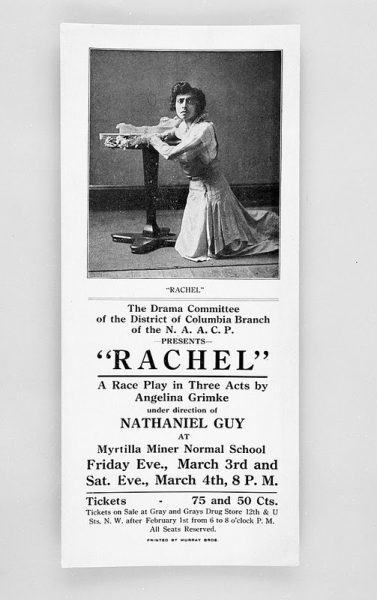by Angelina Weld Grimké

This content has been provided by Anti-Racism Daily.
“Rachel,” written in 1916, is considered the first play written, directed, and performed by an all African American cast. It was written by Angelina Weld Grimké (1880-1958), a playwright and poet who often wrote about racism and systemic oppression.
| About “Rachel” Grimké wrote the play in protest of “Birth of a Nation (1915),” a film that glorified the Ku Klux Klan and depicted a racist, demeaning view of Black people in the Reconstruction South. In response, the NAACP commissioned a series of works that would directly counter this hateful rhetoric and produced “Rachel” as part (Howard). This made this play not just a powerful theatrical production but a political piece that worked to make a new narrative mainstream. According to the Gilder Lehrman Institute of American History, the program notes referred to the play as “the first attempt to use the stage for race propaganda to enlighten the American people relative to the lamentable condition of ten millions of Colored citizens in this free republic.”Despite being written over a century ago, the play’s premise remains timely. The protagonist is grieving after witnessing the injustices of Black life in America and experiencing the grief and sorrow of those around her. She vows never to become a mother to avoid the shared suffering of those that lose innocent children to a world of racism. |
| “Then, everywhere, everywhere, throughout the South, there are hundreds of dark mothers who live in fear, terrible, suffocating fear, whose rest by night is broken, and whose joy by day in their babies on their hearts is three parts pain.” Excerpt from “Rachel” by Angelina Weld Grimké |
| The play was often dismissed as “anti-racist propaganda” and criticized for feeling too heavy and bleak. There are no recorded reproductions of the work for decades after its first run (WHYY). But more contemporary actors and directors are reviving this story in this generation, recognizing that the sentiment reflects a world we still live in. The work may have been written over 100 years ago but remains just as urgent and relevant today. |
Despite the significance of “Rachel,” Angelina Weld Grimké is most remembered for her poetry. Born into a prominent biracial family of abolitionists and civil-rights activists, she actively wrote about the injustices that Black people faced during her lifetime. Her work beyond “Rachel” was a critical part of the Harlem Renaissance, an influential movement in African American literary history (NMAAHC). Many of her poems also express a yearning for love and thoughts on loneliness. You can read some of her poetry on poets.org.
Although Grimké was particularly reclusive and private, many of her poems and diary entries suggest that Grimké was queer. Her personal journals wavered “between using male and female pronouns to conceal her lover’s gender”. These letters, which have never been released to the public, “also detail her father’s disapproval of her attraction toward women” (Who’s Who: In Gay and Lesbian History From Antiquity to World War II). She is one of the many LGBTQ leaders that shaped the Harlem Renaissance and paved the path for Black people for decades to come.
“Shuffle Along” by Flournoy Miller and Aubrey Lyles (1921) was the first Black musical success on Broadway.
“A Raisin in the Sun” (1959) by Lorraine Hansberry became “the first drama by an African American woman to be produced on Broadway,” 43 years after the debut of “Rachel”.
Read National Black Theatre’s Brief History of African American Theatre.
Read about other Black poets throughout history (Anti-Racism Daily).

Shanaé Burch believes in the power of storytelling to revive health and reconcile hearts. Her hunch has led her to pursue a doctorate in public health education at Teachers College, Columbia University where she’s studying health equity through the lens of better leveraging arts and culture for wellbeing. www.shanaeburch.com